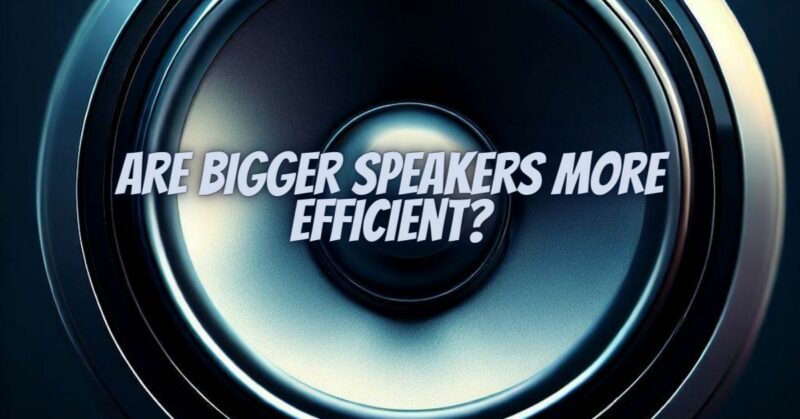When it comes to speaker selection, the idea that bigger speakers are more efficient is a common assumption. Many believe that larger speakers can produce louder and more powerful sound with less effort. However, the relationship between speaker size and efficiency is more nuanced than it might seem. In this article, we’ll explore the concept of speaker efficiency and whether bigger speakers truly hold an advantage in this regard.
Understanding Speaker Efficiency
Speaker efficiency, often measured as sensitivity, is a crucial factor in evaluating a speaker’s performance. Sensitivity is typically expressed in decibels (dB) and represents how effectively a speaker converts electrical power into acoustic energy. A higher sensitivity rating means that a speaker can produce louder sound with less input power.
1. The Size-Volume Connection
One common misconception is that larger speakers inherently produce more significant sound. While it’s true that larger speakers can move more air and create a sense of fullness and depth, this doesn’t necessarily equate to greater efficiency. Speaker efficiency is more closely related to the design and construction of the speaker rather than its size.
2. Design and Materials Matter
Efficiency depends on the speaker’s internal components, including the driver, the magnet structure, and the voice coil. High-quality materials and meticulous engineering can significantly impact a speaker’s sensitivity. Smaller speakers with well-designed components can achieve impressive efficiency ratings.
3. Understanding Sensitivity Ratings
Sensitivity ratings are standardized and measured under specific conditions. A typical sensitivity rating might indicate how loud a speaker can produce sound at one meter’s distance with one watt of input power. While larger speakers may have an advantage in terms of sheer output capability, they can also have lower sensitivity if not designed for efficiency.
4. Efficiency vs. Loudness
It’s essential to distinguish between efficiency and loudness. Efficiency measures how effectively a speaker converts power into sound, while loudness depends on both efficiency and the speaker’s power-handling capabilities. You can have a highly efficient speaker that’s not exceptionally loud if it has limited power-handling capabilities.
5. Practical Considerations
Practical considerations, such as the listening environment and the desired listening level, also play a significant role. In larger rooms or for applications that demand high volume levels, larger speakers with higher power-handling capabilities may be more suitable, even if they have lower sensitivity ratings.
Conclusion
In conclusion, the relationship between speaker size and efficiency is not as straightforward as it may seem. While larger speakers have the potential to produce more significant sound due to their ability to move more air, this doesn’t automatically translate to higher efficiency. Speaker efficiency is determined by a combination of factors, including design, materials, and engineering.
When choosing speakers, it’s essential to consider your specific needs, listening environment, and the desired volume levels. Smaller speakers can be highly efficient and deliver impressive sound quality, especially when they are well-designed and paired with an appropriate amplifier. Ultimately, the “better” speaker is the one that meets your specific requirements and provides the sound quality and volume capabilities you desire, regardless of its size.


